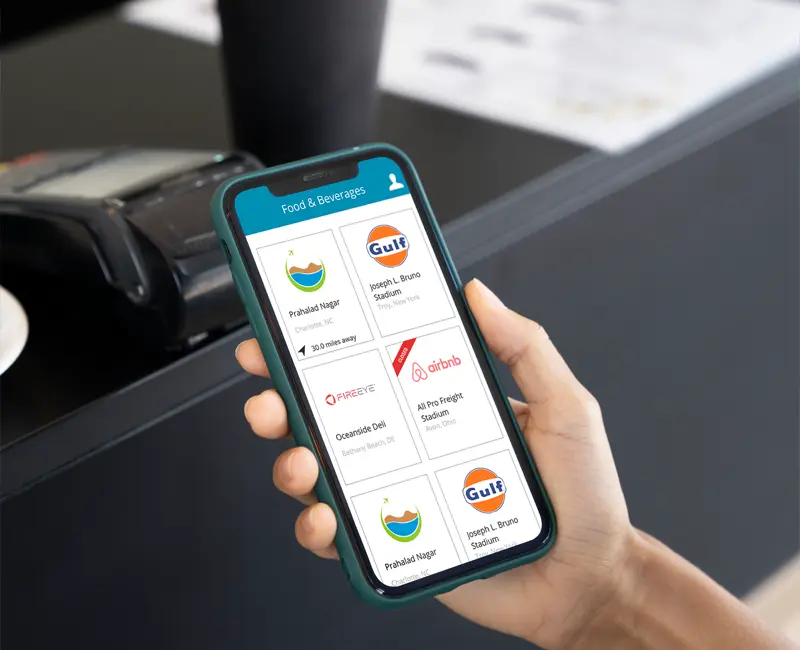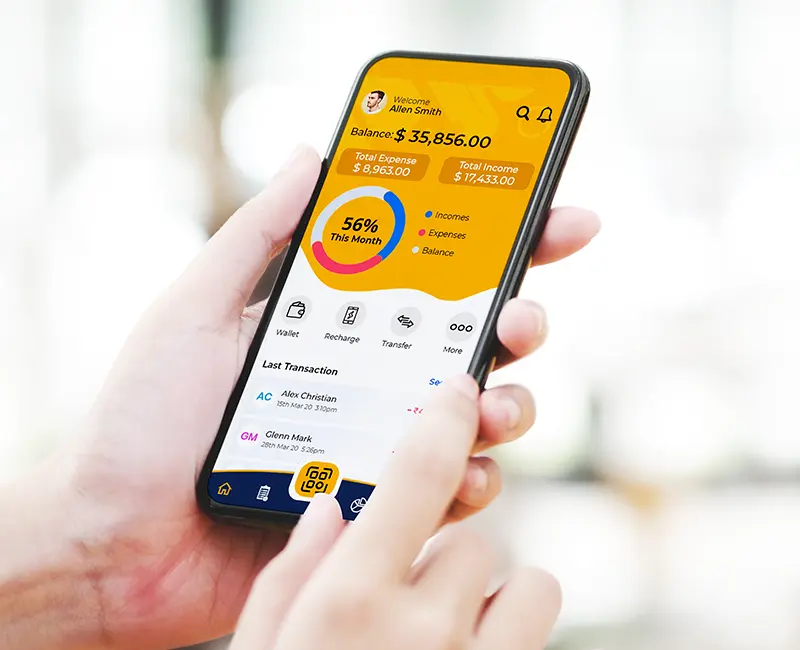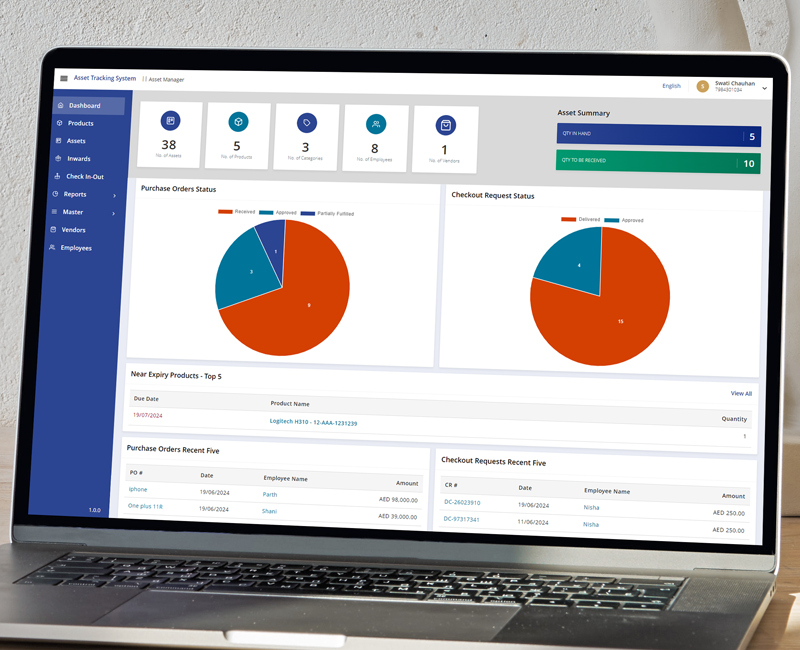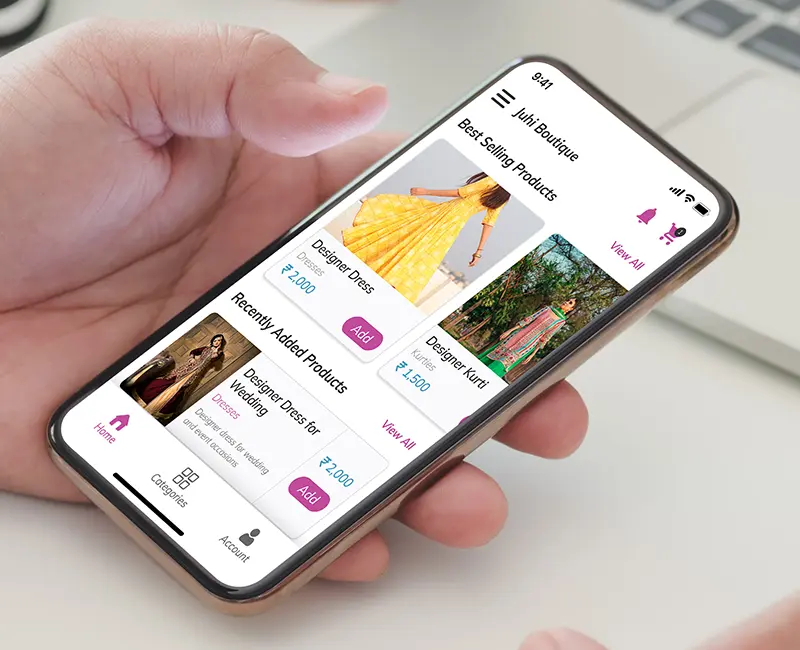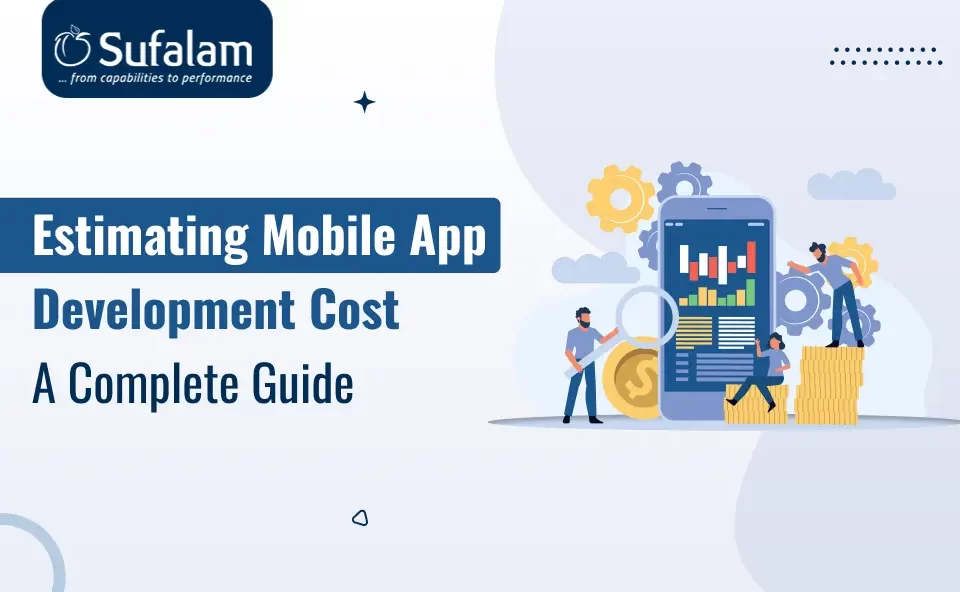Table of contents
- Why Real-Estate Mobile Apps are on the Rise?
- Key Features of Real-Estate Mobile App For Customers
- Key Features of Real-Estate Mobile App For Listers
- Different Types of Real-Estate Apps?
- The Ultimate Guide to Develop a Real-Estate Mobile App!
- How Much Does Real-Estate Mobile App Development Cost?
- To Conclude
- Frequently Asked Questions
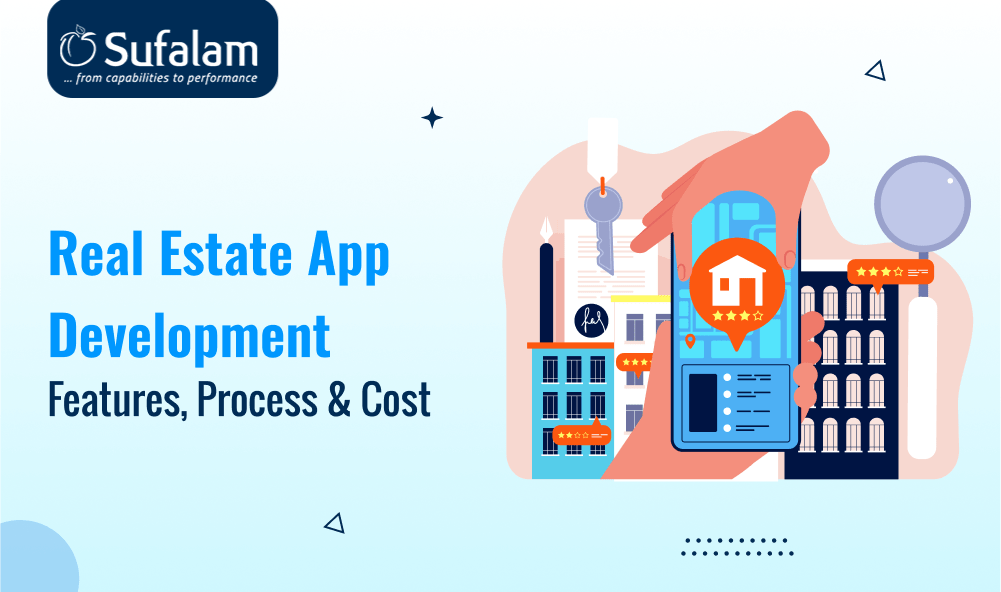
The use of real estate apps has seen a significant surge because of the added convenience and accessibility for varied services such as available housing, signing rental agreements, purchasing new homes, or selling their existing properties online.
Did you know, that in 2022, 96% of customers conducted their property searches online and 60% of them used mobile devices? Due to these increased requirements, real estate firms are looking for different ways to manage all the processes efficiently.
So, if you are struggling with all these challenges and are looking for the best solutions, that can streamline operations while also giving you a competitive edge in the market - then developing a feature-rich, easy-to-use real estate mobile app is the best solution.
If you are looking to level up your digital game and want to develop a feature-rich app, then this guide will cover everything you need to know about Real-estate mobile application development.
Right from market insights and key features to types, processes, and real-estate app development costs - we have got you covered.
Let’s get started.
Why Real-Estate Mobile Apps are on the Rise?
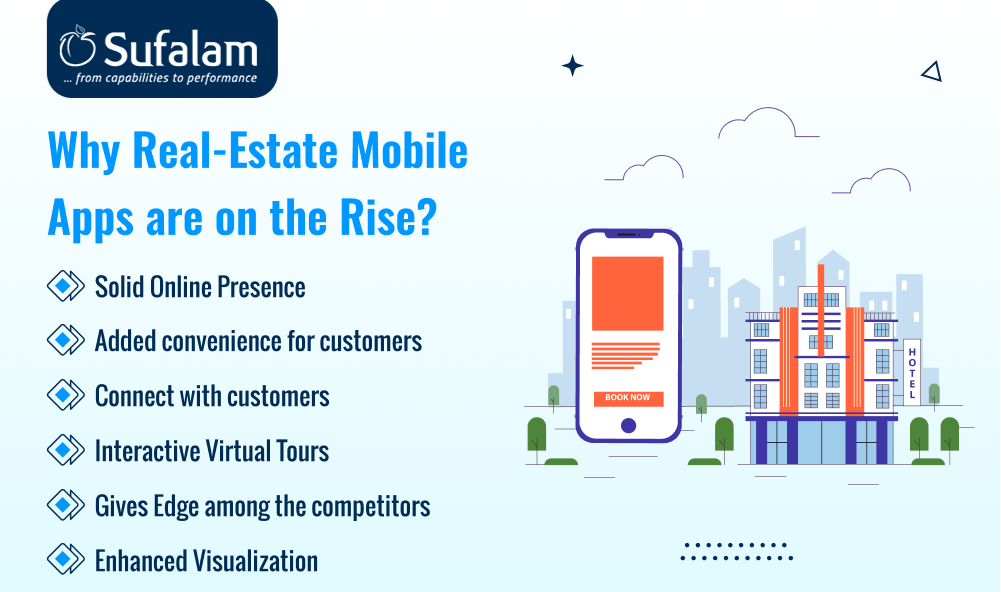
97% of home buyers use a real estate mobile app to search for and purchase properties online. Real estate is an extremely profitable industry, but in this digital age, having an online presence is essential. It will help you establish a solid presence in the market and draw potential customers.
But creating a website is the first step; if you want more exposure, you can also create an app. When you go online and create a feature-rich mobile app, your business will reap numerous benefits. Let’s find out!
Solid Online Presence
In this digital dynamic and with so many players in the market, it is important to have a solid presence. With the feature-rich and dynamic mobile app, you can establish a strong presence and boost your visibility among your potential customers.
Every day more than 1 billion people access the Google Play Store and App Store and you can leverage the effectiveness of these numbers and the benefits of mobile apps for your real-estate business.
Added convenience for customers
A real-estate mobile app provides enhanced convenience to users by allowing them to search, view, and interact with listings anytime and from anywhere. Buyers and renters can easily search the properties at their convenience without the need for physical visits or coordination with agents to fulfill their requirements. This is particularly advantageous for international buyers, people relocating to new areas, or investors looking for properties in different locales.
Interactive Virtual Tours
Real-estate mobile apps provide users with interactive virtual tours in the app. Through this one-of-a-kind feature, potential buyers and renters can virtually walk through properties online. This technology provides a realistic sense of the space, layout, and features of a property, which can help users make informed decisions without needing to visit in person.
Gives Edge among the competitors
With the feature-rich real-estate mobile app, you can set yourself and your business apart from competitors. By providing advanced functionalities such as detailed analytics, virtual tours, and in-app messaging, businesses can offer superior and engaging customer experience. These features attract users and also increase the likelihood of converting browsers into buyers or renters.
Enhanced Visualization
High-quality photo and video galleries along with virtual tours and interactive maps provide the customers with a visually appealing experience. Users get a clear and detailed view of how the property looks, which helps in building trust and interest. It can influence purchasing decisions and increase the likelihood of a transaction.
Key Features of Real-Estate Mobile App For Customers
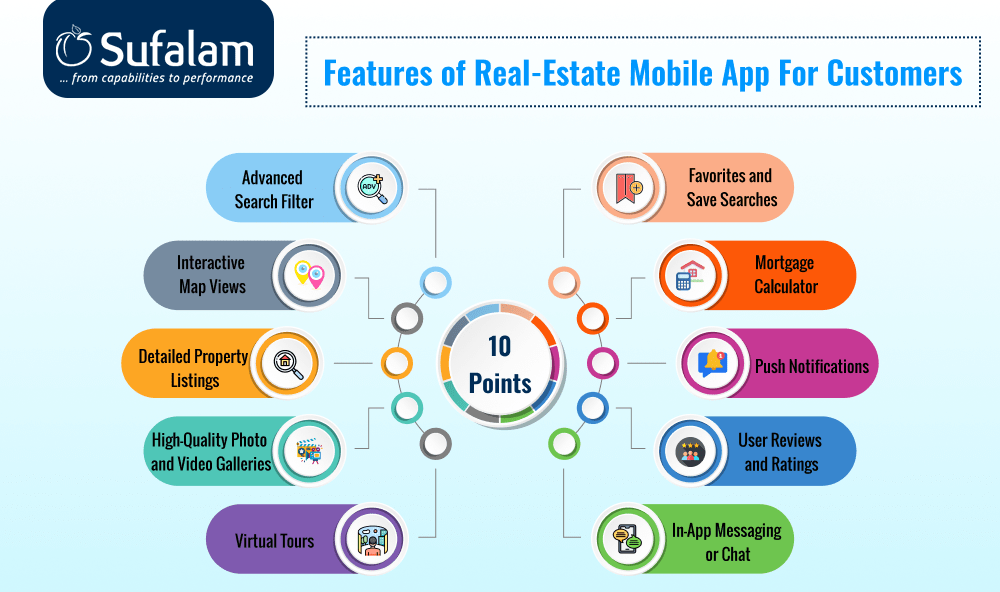
1. Advanced Search Filters: With advanced search filters in the real-estate mobile app, users can easily fine-tune their search results based on various criteria such as location, price, number of bedrooms, property type, and more.
2. Interactive Map Views: An interactive map is another important feature that should be added in an app that provides a visual representation of property locations on a map, which lets users see the exact location, and surrounding areas and view details about local amenities.
3. Detailed Property Listings: While designing a real-estate mobile app, make sure to add detailed property listings such as location, square footage, number of rooms, amenities, price, and more to help buyers or renters make informed decisions.
4. High-Quality Photo and Video Galleries: While you are showcasing properties or related, high-resolution images and video tours are more than important, giving users a clear view of the property’s appearance and layout before visiting in person.
5. Virtual Tours: Allows users to take a digital tour of a property from their devices, providing a 360-degree view of interiors and sometimes even exteriors, enhancing the viewing experience.
6. Favorites and Save Searches: Allow the users to save their favorite properties and searches to easily access them later. It comes in handy for quick comparison and checking of the listings they are interested in.
7. Mortgage Calculator: Mortgage calculators help users calculate potential monthly mortgage payments based on the price of the home, down payment, interest rate, and other financial factors, which further help in budget planning. It’s an added feature that you can add to simplify the lives of your users.
8. Push Notifications: In mobile apps, the feature of push notifications is quite helpful as it helps users get easy updates and alerts directly on their devices about new listings, price drops, or other relevant information based on their saved searches or preferences.
9. User Reviews and Ratings: Features feedback and ratings from previous buyers or renters about properties, neighborhoods, or real estate agents, to build trust among the users and help them make the right decision.
10. In-App Messaging or Chat: Also, incorporate the feature of in-app messaging, that streamlines communication between potential buyers/renters and sellers/landlords or agents directly within the app, enhancing the interaction and negotiation process.
Key Features of Real-Estate Mobile App For Listers
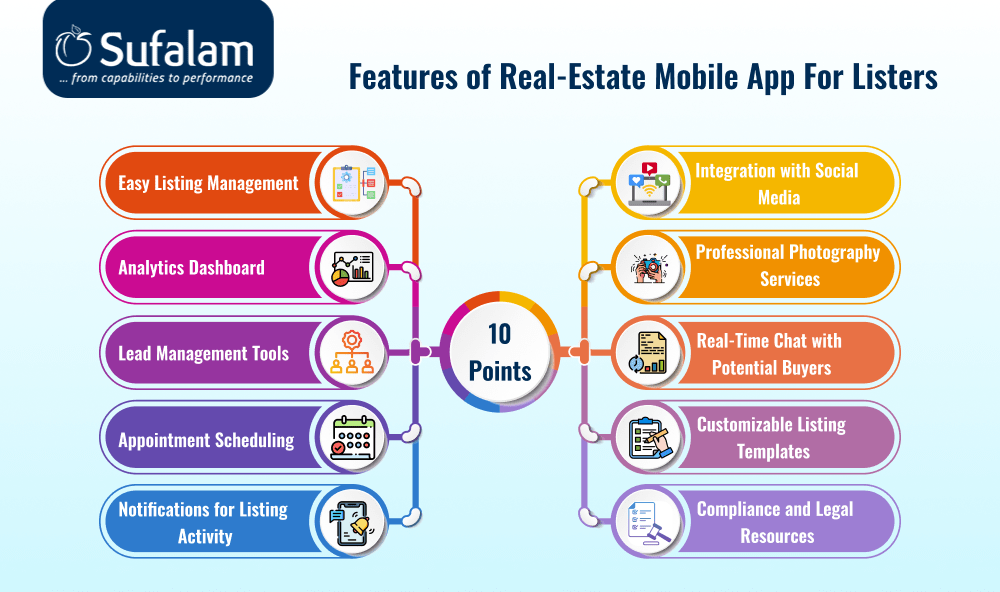
1. Easy Listing Management: It should include a user-friendly interface for sellers or landlords to post, update, and manage their property listings, making the process straightforward and efficient.
2. Analytics Dashboard: Analytics dashboards are quite important. It offers insights into how listings are performing through metrics such as views, clicks, and inquiries, helping listers make informed decisions about how to improve their listing's visibility and attractiveness.
3. Lead Management Tools: Make sure to include comprehensive lead management. It helps track and manage potential buyer or renter leads, organizing communication and responses efficiently to enhance conversion rates.
4. Notifications for Listing Activity: Alerts listers about activities related to their listings, such as new inquiries, feedback, or scheduled appointments, keeping them informed in real-time.
5. Integration with Social Media: Allows listers to share their property listings on social media platforms directly from the app to increase visibility and attract more potential buyers or renters.
6. Real-Time Chat with Potential Buyers: Enables direct communication with interested parties within the app, facilitating faster responses and better interaction.
Different Types of Real-Estate Apps?
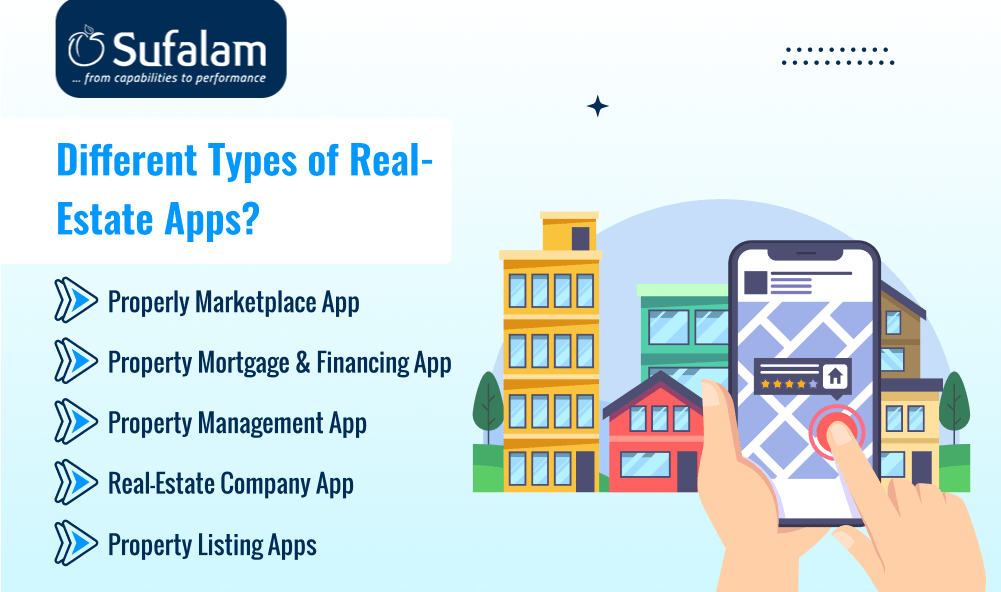
Properly Marketplace App
The Property Marketplace app lets users list, sell, rent, and buy real estate based on their requirements, complete with relevant details and photos, all under one roof. By listing properties and relevant requirements, these platforms enable property managers, brokers, and realtors to swiftly and directly connect with their clients and real estate owners.
These apps have three panels: the admin, the realtors, and the customers.
- Realtors use the app to list their properties with the necessary details.
- Customers looking to buy, rent, buy, or sell properties select one that they like and request the realtors' contact information.
- The administrator charges a fee for providing multiple listing services and takes a commission from clients and realtors who close deals on properties.
Property Mortgage & Financing App
Property banking applications are another popular type of real-estate app and are also known as mortgages and financing applications. It gives users quick access to funding for a variety of real estate-related transactions, such as purchasing, selling, renting, or investing.
Additionally, consumers can choose from a variety of loan options offered by various financial institutions by using these mobile applications, depending on what best fits their needs. Additionally, it allows the banks to show their financial offers to prospective clients while streamlining the processes for both customers and agents.
In addition, users can email the necessary paperwork to banks so they can assist in determining their eligibility for a loan by uploading it.
Property Management App
The purpose of property management apps is to assist real estate agents in efficiently and successfully managing their properties. Key data, including rent payments, maintenance requests, and tenant information, can be accessed through these apps.
They also provide features like payment tracking, messaging, and reminders. Property management applications may assist real estate professionals save time and money while offering a better and more efficient service to their tenants and clients.
Real-Estate Company App
This dedicated real estate company app is ideal for all property builders. Businesses can use this app to list all their properties in one location, manage them at their convenience, and handle accounting duties concurrently.
Additionally, users of this kind of real estate app can showcase their properties for sale with a variety of attributes, including price, size, type, location, and more. Users can also rack the real estate status of their properties. This enables the business to attract more clients, raise the rate of client retention, and enhance the reputation of the brand.
The Ultimate Guide to Develop a Real-Estate Mobile App!
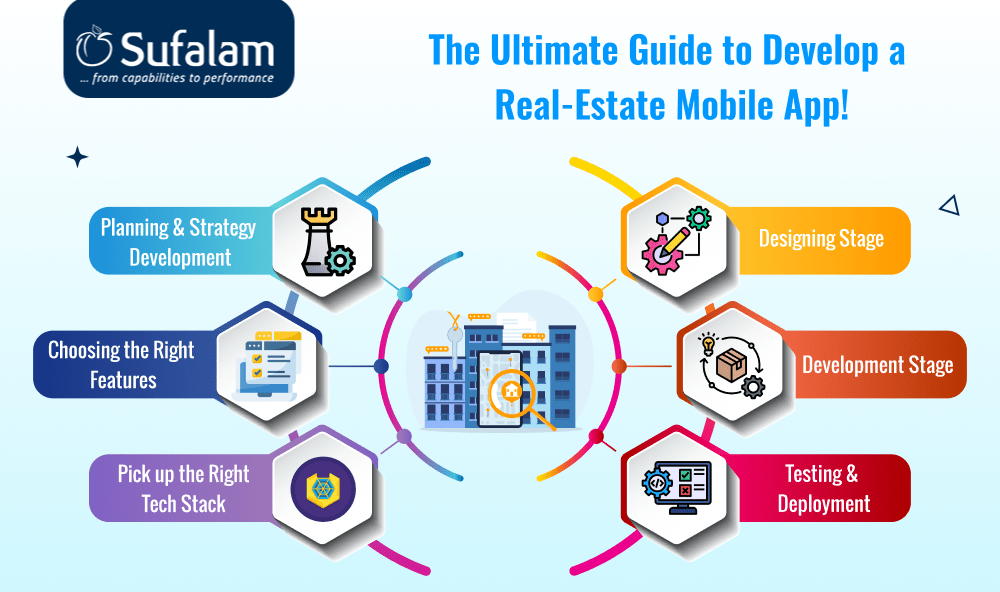
Step 1: Planning & Strategy Development
The process of developing a real estate mobile app begins with a thorough understanding of the project's fundamentals. For effective planning and strategy, you must conduct an end-to-end analysis of the target market, competitors, market, and other relevant factors. It's one of the first crucial steps that you must take to ensure success!
You need to be specific about the kind of real estate app you are developing.
- Are you creating a platform for renting, selling, and buying?
- Are you producing anything along the lines of customer relationship management?
- Are you creating an investment platform?
- Are you developing an app that will enable you to determine the market value and rental income of your property?
Once you are clear about your requirements, you can get started with the real-estate app development process. To get expert guidance and development solutions, you can partner with a professional real estate application development company. They can understand your requirements and will help you set up a proper plan for its development.
Step 2: Choosing the Right Features
The next step in building a full-fledged real-estate app is incorporating the right features. You need to understand what your users want, and what the end goal that you are trying to target is and then decide the features accordingly.
If your app is catering to more than one type of user, then you need to add the features, keeping in mind the needs of different users.
Do the market research, see what your users want and what your competitors are doing, and then add the necessary features. Try to add advanced features as well - which can give you an edge in the market. At the same time, don’t overcomplicate with the features and try to keep it simple yet effortless.
Step 3: Pick up the Right Tech Stack
It's time to select the appropriate platform and technology stack for your real-estate mobile app development project, whether it be iOS or Android, or both. This decision is based on identifying the tasks that must be completed in order to have a tech stack that supports the desired results.
To make the right decision, you can partner with the leading real-estate mobile app development company - who can understand your project inside out and can help you choose the right tech stack.
Step 4: Designing Stage
The app's functionality is critical, but its design helps customers decide whether to delete or keep it. Apps that put simplicity and ease of use first perform exceptionally well in a crowded real estate market.
Consider the user when designing to ensure a targeted design to ensure the best and custom results. Not only does a targeted design draw in users, but it also increases engagement and loyalty.
The overall user experience on your real-estate mobile app should be seamless, easy to use, and accessible. The navigation should also be simple and uncomplicated; so you need to avoid using clumsy menus and hide overly complex navigation. Additionally, be sure to carefully use your brand colors in your design.
Step 5: Development Stage
After the design is finalized, developers work on creating a strong backend to manage data and security, while also developing the frontend to make the app look and work as designed. This phase focuses solely on building out the app’s capabilities and ensuring each part functions well with the others, laying a solid foundation for the subsequent testing and deployment stages.
By using the right tech stack and keeping the users in mind, you can ensure the targeted development solutions. To get the best results, you can hire dedicated developers and avail the of high-quality mobile app development services.
Step 6: Testing & Deployment
After the development, the next step is testing and deployment. Before deploying your real estate app to your end users, you must thoroughly test it to identify and resolve any issues or bugs.
You can release the app on the Play Store and App Store after the testing and debugging for the users to download. Make sure you optimize it thoroughly for search engines to increase downloads and rankings.
Remember, it takes more than just building an app to make it successful in the long run. You also need to provide regular support and maintenance services to keep your app updated and maintained.
How Much Does Real-Estate Mobile App Development Cost?
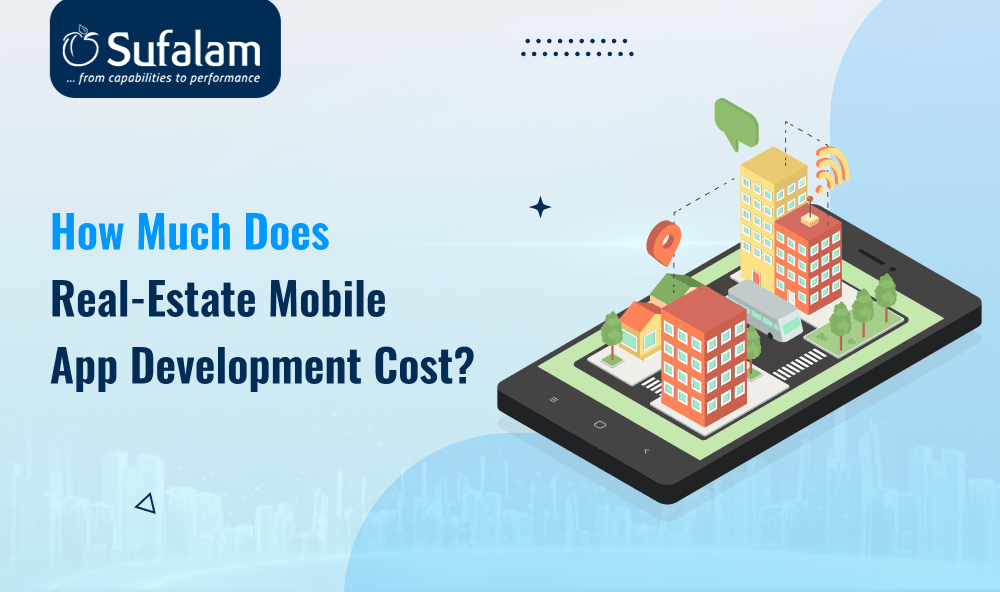
The complexity of the app will determine the overall real-estate mobile app development cost. A basic app will cost you anywhere from $25,000 to $45,000. But sophisticated software can cost you more than $70,000.
Real estate business owners frequently hire dedicated developers to get quality solutions on a budget. The hourly pay for developers of real estate apps varies greatly by location.
In the US, the average hourly rate for seasoned real estate developers varies depending on location and level of experience from $100 to $200. Rates in Europe range from $50 to $150 per hour, whereas rates in Asian countries are generally lower ($15 to $50 per hour) while delivering high-quality real estate services.
However, to get an accurate estimate for the Real-estate mobile application development cost, connect with us and we will get back to you with a comprehensive quote.
To Conclude
Here’s the complete guide to developing a stunning mobile app for your real-estate business. It is the ultimate guide, which covers everything - right from features and processes to types of real-estate applications and the cost to develop a real-estate mobile app.
And, we hope you have found this blog helpful in developing a feature-rich, user-friendly real-estate mobile app. Also, don’t forget to regularly update your app keeping in mind the requirements of your users and market trends.
If you are looking for a leading mobile app development company, who can understand your business requirements and provide the best solutions, then Sufalam can be your trusted partner. Our team of skilled designers and developers has rich industry expertise and can help you achieve the best solutions.
Frequently Asked Questions
Are real estate apps secure for transactions?
Yes, if your real-estate mobile app is developed with the best-in-class security measures in mich, like encryption, secure payment gateways, etc – then it is absolutely secure for the transactions.
What makes a real estate mobile app better than a website?
Mobile apps generally provide a better user experience tailored for on-the-go access, with features like location-based services, instant notifications, and offline access to saved properties, making them more convenient than traditional websites for customers.




